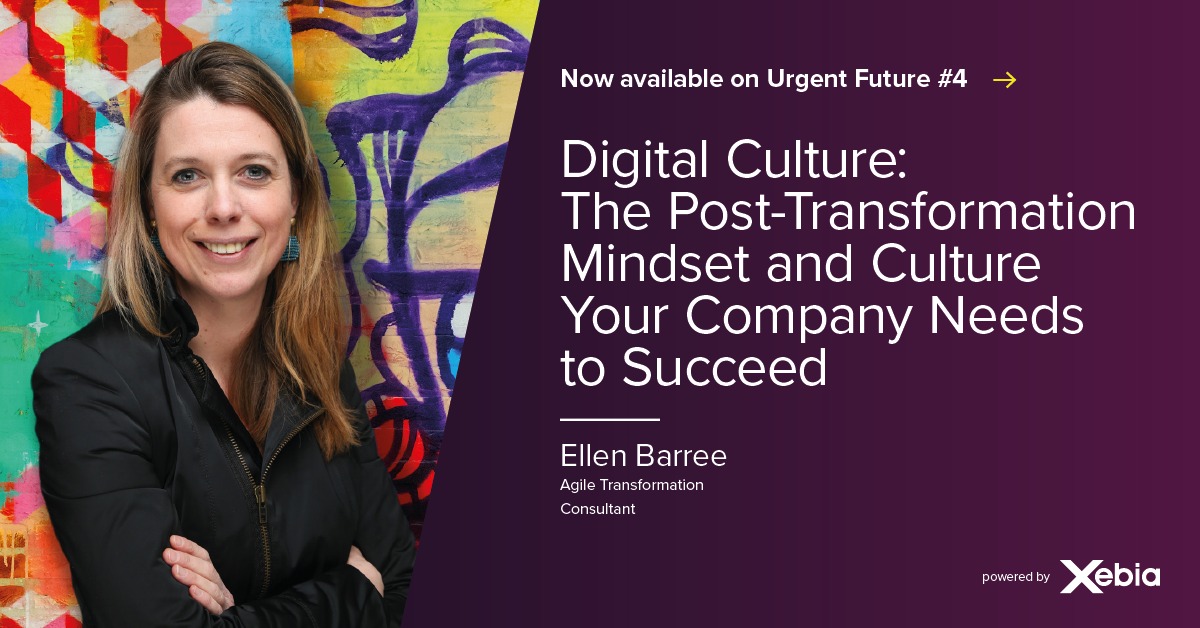IN AN INCREASINGLY DIGITAL WORLD, PEOPLE ARE ALWAYS CONNECTED—AND SO IS YOUR CUSTOMER.
They can do the research and make informed choices at all times. Now more than ever, it’s essential to have a strong connection to your customers and to understand their customer journey so that you can respond continuously and quickly. This requires a transition from a product-driven to a market and customer-driven approach.
What does this mean for your organizational culture? What does a fully digitalized organization need when it comes to values, beliefs, habits, and tangible elements?
These are the top four building blocks for a successful digital culture.
1. A strong corporate identity
To transition from a product-focus to a customer-focus, you need a strong organizational identity that manifests in a clear purpose. The purpose should be propagated across all levels of the organization and give employees a touchstone for their ideas, initiatives, and daily work. Visible, visionary leadership that communicates this shared purpose clearly to all team members will ensure it provides drive and direction for all daily activities.
Within an organization, leadership carries culture. Leaders give direction, set frameworks, and, through their behavior, embody the organization’s aspirations to both employees and customers.
2. An internal and external focus on innovation and renewal
To remain relevant to the customer, you need to have the power to innovate. You must demonstrate creativity and the ability to turn ideas into actual products and services. Innovation requires people who have the capacity and freedom to think outside the box. It also helps the company follow a carefully designed process that nourishes innovation. For this, you need an environment that actively encourages thinking differently.
Learning by doing, and experimentation must be at the core of this culture.
3. Access to and knowledge of the latest technology
Access to the right data at the right time is crucial for collecting relevant customer information and allows you to make the right decisions. A robust digital culture recognizes the importance of appropriate data use and has incorporated it into the way their teams work. In addition, most employees are able to use the right data for individual activities, making them less dependent on a limited number of experts.
Also, technology must be at a level where adjustments can be implemented rapidly.
Employees with an inherent interest in the latest technological developments and with the skills to quickly master these advances are invaluable to this end.
4. Continuous attention to the physical and mental health of employees
Making decisions based on the most accurate available information increases speed, uses available talent, and simultaneously instills ownership and autonomy in employees. So, leaders must create a safe psychological environment by giving employees trust and leeway to make decisions based on their own knowledge and skills.
A successfully digitalized organization must implement and prioritize rapid technological adjustments and nurture the creativity necessary to sustain that level of adaptation. Every member of the organization must stay curious about both the customer and the technological possibilities. Employees must feel connected to the organization’s purpose and invest in its success. They must be passionate and driven to develop professionally.
All of this requires a company culture that enables team members to support, inspire, and share knowledge.
Successful leaders take responsibility for designing and maintaining this culture by visibly prioritizing employee health and development.
This article is part of the Urgent Future Magazine.
You can find more information about Culture and Ellen Barree in AGILE NXT.





